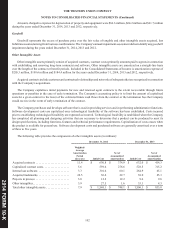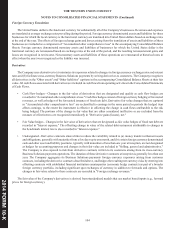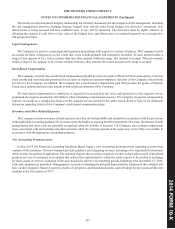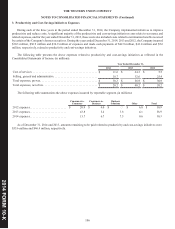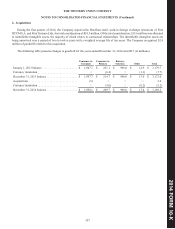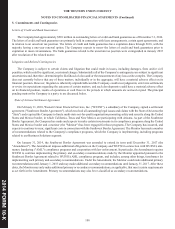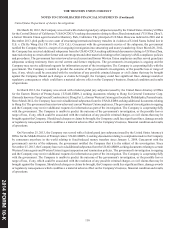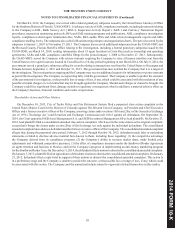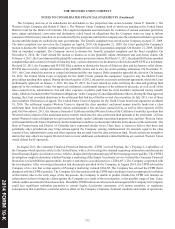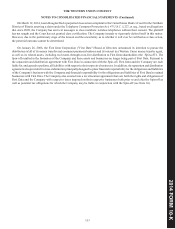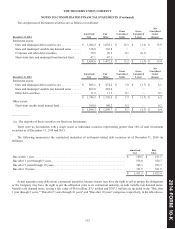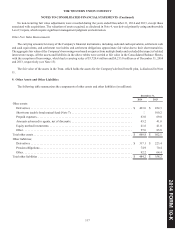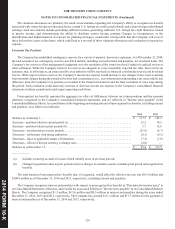Western Union 2014 Annual Report Download - page 250
Download and view the complete annual report
Please find page 250 of the 2014 Western Union annual report below. You can navigate through the pages in the report by either clicking on the pages listed below, or by using the keyword search tool below to find specific information within the annual report.
2014 FORM 10-K
THE WESTERN UNION COMPANY
NOTES TO CONSOLIDATED FINANCIAL STATEMENTS (Continued)
112
The Company and one of its subsidiaries are defendants in two purported class action lawsuits: James P. Tennille v. The
Western Union Company and Robert P. Smet v. The Western Union Company, both of which are pending in the United States
District Court for the District of Colorado. The original complaints asserted claims for violation of various consumer protection
laws, unjust enrichment, conversion and declaratory relief, based on allegations that the Company waits too long to inform
consumers if their money transfers are not redeemed by the recipients and that the Company uses the unredeemed funds to generate
income until the funds are escheated to state governments. The Tennille complaint was served on the Company on April 27, 2009.
The Smet complaint was served on the Company on April 6, 2010. On September 21, 2009, the Court granted the Company's
motion to dismiss the Tennille complaint and gave the plaintiff leave to file an amended complaint. On October 21, 2009, Tennille
filed an amended complaint. The Company moved to dismiss the Tennille amended complaint and the Smet complaint. On
November 8, 2010, the Court denied the motion to dismiss as to the plaintiffs' unjust enrichment and conversion claims. On
February 4, 2011, the Court dismissed the plaintiffs' consumer protection claims. On March 11, 2011, the plaintiffs filed an amended
complaint that adds a claim for breach of fiduciary duty, various elements to its declaratory relief claim and WUFSI as a defendant.
On April 25, 2011, the Company and WUFSI filed a motion to dismiss the breach of fiduciary duty and declaratory relief claims.
WUFSI also moved to compel arbitration of the plaintiffs' claims and to stay the action pending arbitration. On November 21,
2011, the Court denied the motion to compel arbitration and the stay request. Both companies appealed the decision. On January
24, 2012, the United States Court of Appeals for the Tenth Circuit granted the companies' request to stay the District Court
proceedings pending their appeal. During the fourth quarter of 2012, the parties executed a settlement agreement, which the Court
preliminarily approved on January 3, 2013. On June 25, 2013, the Court entered an order certifying the class and granting final
approval to the settlement. Under the approved settlement, a substantial amount of the settlement proceeds, as well as all of the
class counsel’s fees, administrative fees and other expenses, would be paid from the class members' unclaimed money transfer
funds, which are included within "Settlement obligations" in the Company's Consolidated Balance Sheets. During the final approval
hearing, the Court overruled objections to the settlement that had been filed by several class members. In July 2013, two of those
class members filed notices of appeal. The United States Court of Appeals for the Tenth Circuit heard oral arguments on March
18, 2014. The settlement requires Western Union to deposit the class members' unclaimed money transfer funds into a class
settlement fund, from which class member claims, administrative fees and class counsel’s fees, as well as other expenses will be
paid. On November 6, 2013, the Attorney General of California notified Western Union of the California Controller’s position that
Western Union’s deposit of the unclaimed money transfer funds into the class settlement fund pursuant to the settlement “will not
satisfy Western Union’s obligations to report and remit funds” under California’s unclaimed property law, and that “Western Union
will remain liable to the State of California” for the funds that would have escheated to California in the absence of the settlement. The
State of Pennsylvania and District of Columbia have expressed similar views. Thus, there is reason to believe that these and
potentially other jurisdictions may bring actions against the Company seeking reimbursement for amounts equal to the class
counsel’s fees, administrative costs and other expenses that are paid from the class settlement fund. If such actions are brought or
claims that may otherwise require Western Union to incur additional escheatment-related liabilities are asserted, Western Union
would defend itself vigorously.
In August 2013, the Consumer Financial Protection Bureau (the “CFPB”) served Paymap, Inc. (“Paymap”), a subsidiary of
the Company which operates solely in the United States, with a civil investigative demand requesting information and documents
about Paymap’s Equity Accelerator service, which is designed to help consumers pay off their mortgages more quickly. The CFPB’s
investigation sought to determine whether Paymap’s marketing of the Equity Accelerator service violated the Consumer Financial
Protection Act’s prohibition against unfair, deceptive and abusive acts and practices (“UDAAP”). The Company cooperated with
the investigation. After reviewing information and documents provided by the Company, in August 2014, the CFPB advised the
Company of its view that certain aspects of Paymap’s marketing violated UDAAP. The Company has advised the CFPB that it
disagrees with the CFPB’s position. The Company is in discussions with the CFPB and is seeking to reach an appropriate resolution
of this matter. Due to the early stage of the discussions, the Company is unable to predict whether the CFPB will institute an
enforcement action to bring any claims against the Company as a result of the investigation, or the possible range of loss, if any,
which could be associated with such an action. Should the CFPB institute an enforcement action against the Company, the Company
could face significant restitution payments to certain Equity Accelerator consumers, civil money penalties, or regulatory
consequences that could have a material adverse effect on the Company’s business, financial condition and results of operations.


